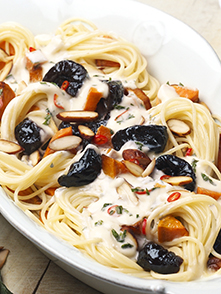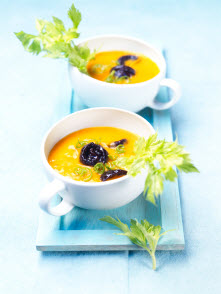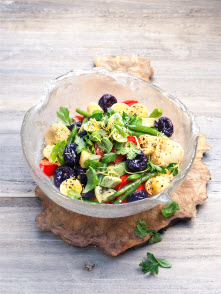We regularly publish some great healthy living tips, new recipes and other Prune tidbits on our blog
Sunsweet
Posted Tue, Jun 29, 21 by Sunsweet
Sweet Potato Ragout with Prunes
Posted Fri, Jun 11, 21 by Sunsweet
Sweet potato, prunes and accents of warming chili, this is a dish that everyone will love. But did you know that prunes contain nutrients like vitamin K and manganese that can help to maintain healthy bones. Research suggests that - because of the nutrients that they provide - the fruits may well have bone health boosting benefits. So tuck in!
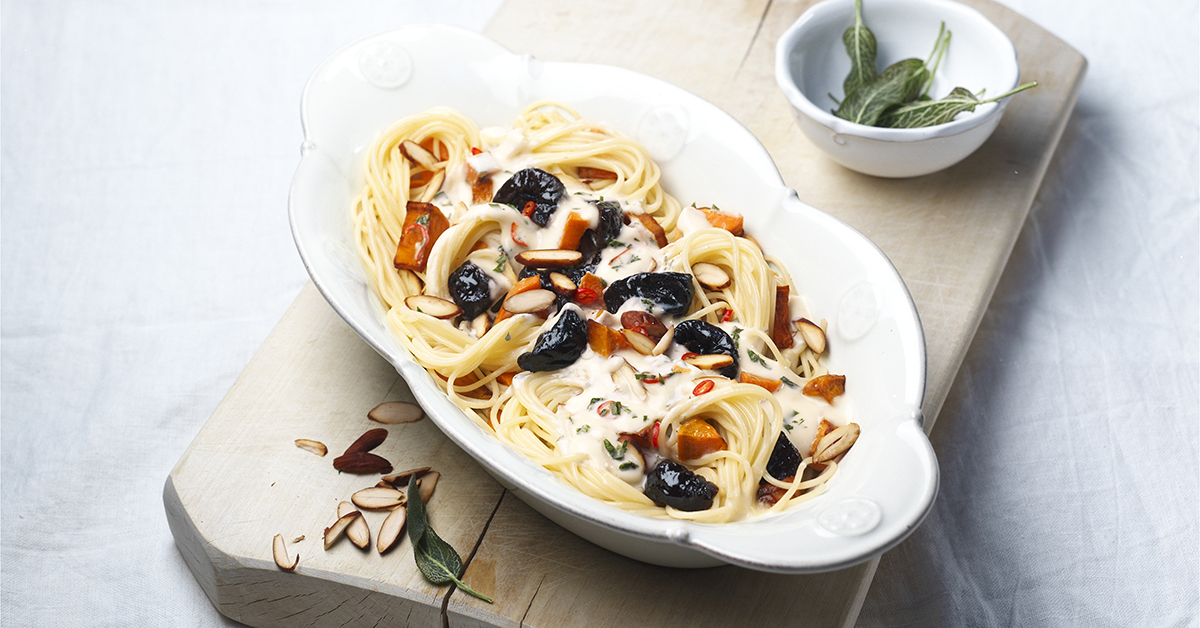
Ingredients
300 g sweet potatoes
2 onions
½ bunch of sage
5 parsley sprigs
2 red chilli peppers
50 g almonds, sliced
350 g Capellini (angel hair pasta (thinner) OR vermicelli (thicker) )
3 tbsp. olive oil
200 ml vegetable stock
250 g ricotta cheese
150 g California prunes
Nutmeg
3 tbsp. lime juice
Salt, pepper
Instructions
- Peel sweet potatoes and cut into 1 cm cubes. Peel and dice onions. Finely chop sage and parsley. Cut chilli into rings. Roast almonds in a pan without oil. Cook the pasta according to package directions.
- Heat oil in a pan. Add the potato cubes and sauté over medium heat for about 5-10 minutes. Add onions and herbs and sauté for 2 more minutes. Deglaze with vegetable stock. Add ricotta and prunes and simmer 1 minute longer. Season with salt, pepper, and nutmeg.
- Add pasta and lime juice. Serve sprinkled with almonds.
Tip: Sauté sage leaves in a little bit of oil until crispy and serve with the pasta.
Other recipes you might be interested in...
Tackling Tummy Troubles while Travelling
Posted Wed, Jun 16, 21 by Sunsweet
Tummy troubles are no joke, especially when you’re travelling and especially when you have small kids in tow. But are digestive complaints - like constipation – just “one of those things” when the family is on the move or are there some simple steps that you can take to nip any potential problems in the bud?

For many of us, holidays can mean:
- Taking our eye off the healthy eating ball with far more treats in our diet than we’re used to (and with far less fibre).
- Getting dehydrated. As the sun comes up, temperatures rise making everyone a little hotter – and a little thirstier - than they’re used to. And as the sun goes down, exotic cocktails can be a temptation for the grown-ups in the group. It’s really important to keep fluid levels topped up but – sorry! – alcoholic drinks don’t count.
- Relaxing by the pool rather than swimming the length and breadth of it. All that sunshine can make physical exercise feel like way too much effort.
And that little trio can combine to upset the bodily functions that most of us are usually lucky enough to be able to take for granted, resulting in a sluggish digestion.
Digestion is a complex physical process and when the digestive system gets out of synch, the whole body can feel its effects. Digestive troubles are far from uncommon amongst holiday-makers. That’s according to a survey by CondéNet and the California Dried Plum Board. More than 75% experienced occasional digestive problems while traveling and 42% suffered from constipation.
A sluggish digestion can quickly start to cause physical discomfort and even anxiety. So what can be done? We’ve pulled together our top tips for keeping things moving while you’re on the move.
Choose Well
Make healthy food choices - wherever possible – and make sure you drink lots. Water and diluted fruit juices are both excellent choices as they can quench your thirst and contribute towards good nutrition.
Keep Moving
Make sure that you factor in some daily exercise when your routine changes. Even while you’re travelling, it’s usually possible to move around from time to time. And something as simple as a brief stroll or a quick stretch really can work wonders.
Plan Ahead
Stock up on a selection of healthy, on-the-go snacks to take with you. Prunes, for example, are proven to promote healthy digestion. You can take the fruit with you, wherever you go. And the best news? Prunes are absolutely delicious!
Chill Out
Although it's not usually stress itself that causes health problems – like digestive issues - but how you handle that stress, it’s still important to find ways to unwind that work for you. Don’t forget to enjoy the journey!
Good digestive health – it’s what we do!
At Sunsweet, we’re passionate about good digestive health. Why not check out our top four tips for good digestive health and Simple Health Tips for People on the Go.
And if you’re looking for more comprehensive info, you can download our Healthy Living Guide!
Bon Voyage!
Please Note: Prunes are good for digestion and help keep you regular, when 100g are eaten as part of a varied and balanced diet and an active lifestyle. Always consult a GP if you have any health concerns.
The benefits of a well-stocked store cupboard
Posted Fri, Nov 13, 20 by Sunsweet
When you’re trying to make healthy choices around food, a little advance planning can go a long way. With a well-stocked fridge and store-cupboard and a repertoire of tasty, healthy and simple-to-prepare dishes up your sleeve, you won’t go too far wrong!

Temptation can be so hard to resist – especially when you’re feeling both tired and hungry. And that’s where healthy snacking comes into its own. Factoring in small snacks between meals can help to keep your appetite in check, your hunger satisfied, and help you to make healthier mealtime choices. Try to have a few healthy, grab-and-go options close to hand. Dried fruit – like SUNSWEET prunes - can be stashed in your desk drawer, your bag or your car’s glovebox so that you’re never too far away from a tasty treat.
Meals that Matter
Breakfast
It’s often described as the most important meal of the day. But it’s a meal that – when you’re up against it, time-wise – can all too often get skipped. Smoothies are the perfect solution for a speedy and nutrition-packed breakfast. Check out our recipe ideas for flavour combos that will suit the faddiest of eaters. And – if you’re really pushed for time – decant your smoothie into a travel cup and sip it on the run.
Lunch
Soup really is the ultimate lunch. Choose your recipe wisely and it’ll go a long way towards your 5-a-day. And, if you’ve a fussy eater in the family, soup can be buzzed super-smooth to surreptitiously deliver those nutrient-packed veggies. Why not take a look at our recipe pages? Most of our soups can be kept in the fridge for a few days or can even be frozen, for another time. Making friends with batch-cooking can be a great way to ensure that a healthy family meal is only ever a matter of minutes away.
Dinner
For mid-week meals, one-pot recipes really come into their own. You could prep the meal together, as a family, to boost that sense of connectedness. The tiniest of tots can wash veg, at the kitchen sink. And then - once your meal is prepped and popped into the oven – you’ll have a nice big chunk of quality time to enjoy together while the enticing aroma of dinner surrounds you.
Bon appetit!
Why not give prunes a go?
Did you know that prunes are surprisingly versatile? They can be used to add a nutritious boost to a variety of family meals - sweet and savoury – and their flavour adds both depth and richness. Try some of our delicious recipes!
Please Note: Prunes are good for digestion and help keep you regular, when 100g are eaten as part of a varied and balanced diet and an active lifestyle. Always consult a GP if you have any health concerns.
The Benefits of Exercise and Bone Strength
Posted Fri, Jun 11, 21 by Sunsweet
Osteoporosis is a global issue, affecting up to one in three women and one in five men. Genetic factors have a role to play in determining an individual’s likelihood of developing osteoporosis but lifestyle factors also have an influence. Simple steps can be taken – like a routine of weight-bearing, muscle-strengthening exercise - to help improve bone-health.

But how prevalent is osteoporosis?
The condition causes bones to weaken so that they break more easily. According to the IOF, up to one in three women and one in five men (aged 50+) will suffer an osteoporotic fracture. These fractures can prove painful, cause long-term disability or even be life-threatening.
Can anything be done, to help prevent osteoporosis?
Although genetic factors do have a role to play in determining an individual’s likelihood of developing osteoporosis, lifestyle factors can also have an influence. And fortunately there are some simple steps that can be taken, to improve bone-health no matter what your gender, life-stage or bone-health status. These steps include:
- A routine of weight-bearing, muscle-strengthening exercise
- A balanced diet, rich in nutrients like calcium, protein and vitamin D
- Cutting out the cigarettes and limiting alcohol consumption
The role of exercise
Building and maintaining bone health is essential for both genders and at all life-stages. And exercise really is an excellent starting point, to build and maintain bone and muscle strength. Adults who get insufficient exercise lose bone density more quickly than their fit-as-a-fiddle counterparts. And sedentary older people are far more likely to suffer fractures. According to the IOF, this is because bones respond and strengthen when they are 'stressed' and the best way to achieve this? By getting plenty of weight bearing exercise.
What is weight-bearing exercise?
Weight-bearing exercise – the kind that’s good for your bones – is any form of exercise that requires you to work against gravity. Swimming and cycling, for example, would not be weight-bearing but good examples of weight-bearing activities include:
- Weight training
- Hiking
- Running
- Tennis
- Dancing
So, what are you waiting for? Your bones - not to mention the rest of your body - will thank you for a good-old workout.
And why are Sunsweet involved with the campaign?
Plenty of fruit and veg, as part of a nutritious diet, simple things that are bound to have a positive impact on overall health. And bone health is no exception. Did you know that prunes can be an ally when it comes to bone health management? Research suggests that the nutrients in them – things like vitamin K and manganese – can help to maintain normal bones. Yet more reasons to stock up on these tiny – and scrummy – nutritional power-houses!
More info:
If you’d like to find out more about bone health, please do take a look at the Prunes and Bone Health section of our website. Or visit our dedicated Bone Health library where you can download informative and yet simple-to-read whitepapers including the following:
- Love Your Bones! – Bone Health and Prunes
- Serve up Bone Strength – IOF Patient brochure
- IOF Fact Sheet
- Know Your Risk– IOF Patient brochure
Please Note: Prunes are good for digestion and help keep you regular, when 100g are eaten as part of a varied and balanced diet and an active lifestyle. Always consult a GP if you have any health concerns.
The key to keeping well in winter? Keeping warm!
Posted Thu, Feb 26, 15 by Sunsweet

The key to keeping well in winter? Keeping warm!
Being cold can have a negative impact on health, causing colds and flus and even things like heart problems and depression; that's according to Live Well, healthy living advice from the NHS. So read on, for our top four keeping toasty tips.
- A study by the Yale School of Medicine found that wrapping up warm, snuggling that nose into a cosy scarf, may help to keep colds at bay. That's because the common cold virus is able to multiply more readily when temperatures drop. Professor Akiko Iwasaki says, “If you can prevent the airway temperature from getting lower, it’s probably a good thing." What a fabulous excuse for stocking up on a chic scarf or two!
- Drawing the curtains after nightfall, keeping drafts to a minimum by closing internal doors, using hot water bottles to air your bed... Simple, old-fashioned and cost-effective tips for a cosy home. Try to keep active, even when you're planning to stay in the house. By moving around and dressing in cosy layers, you can help to stop your body's core temperature from plummeting.
- Choosing hearty, nourishing and warming dishes – like soups and stews – can help to stop the body from feeling chilly. Choose ingredients that punch above their weight when it comes to nutrition. Prunes, for example are a source of vitamin B6 and copper which support a healthy immune system. Oats are rich in fibre and release energy slowly. Combine the two – with water or milk - to make a deliciously fruity and satisfying porridge that the whole family will enjoy. An excellent way to kick-start the day, no matter how wintry the morning.
- Hot drinks - enjoyed regularly throughout the day - have an important role to play, too, in keeping warm. Research at the Common Cold Centre, at Cardiff University, studied the effect of hot drinks on colds. Professor Ron Eccles found that, “Both drinks were beneficial, but the hot drink was much more beneficial.” Why not try adding mulled wine spices to prune juice before gently warming it? Delicious!
The Low-Down on Low GI
Posted Fri, Jun 11, 21 by Sunsweet
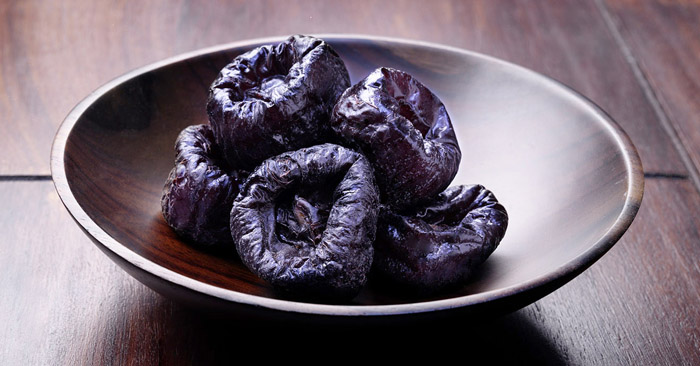
It can be tricky, when you're trying to eat healthily, to keep up with all of the latest buzzwords and acronyms. But don't worry. At Sunsweet, we make it our business to stay ahead in the healthy-eating game.
Ever wondered just what GI means, for example?
Well, in a nutshell, GI – the glycaemic index - measures the effects of carbohydrates on the body's blood sugar. Carbs that are rapidly broken down, during digestion, rapidly release glucose into the bloodstream. And these carbs have a high GI. Carbs that are broken down more gradually, release glucose more gradually and these carbs have a low GI.
Recent studies from Harvard School of Public Health indicate that the risks of diseases such as type 2 diabetes and coronary heart disease are strongly related to the GI of the overall diet.
What’s recommended?
Experts recommend that - to maintain weight and keep blood sugar levels steady - we aim for a diet with an overall GI of 50 or less.
And so sweet and tasty snacks are out, right? Not so, happily. In fact, Sunsweet prunes make an excellent choice. Harvard Medical School found that the GI of pitted prunes is around 29 making them a low-GI fruit that doesn't dramatically affect blood sugar and insulin levels. Excellent news!
The not-so-skinny on sugar
Posted Fri, Jun 11, 21 by Sunsweet
Sugar. It's something that we should all be attempting to cut back on. But does that mean that we have to cut back on fruit, too – like prunes – that make a sweet and tasty contribution towards our 5-a-day? What does the science say, are all sugars created equal?

The introduction of a sugar tax
World Health Organisation (WHO) guidelines recommend that we eat around 25 grams of sugar each day - about 6 teaspoons. But consumption in most countries exceeds this. Currently, Western European adults consume an average of 101 grams of sugar per day ….. that’s about 25 teaspoons!
In a Euromonitor study, Germany was ranked the second-most sugar-loving nation in the world with people eating 103 grams on average. In Ireland, which ranks fourth on the list, sugar intake falls just short of 97 grams, the UK comes in seventh at 93 grams and the Italians consume 57 grams per day.
With rising obesity levels on a European and global level being blamed on an over-reliance on energy-dense foods, several countries have called for the introduction of measures to help curb the intake of sugary foods; health warnings, sales taxes, banning junk foods in schools, restrictions on advertising to children and reduced portion sizes among others.
Variations on a sugar tax have already been introduced in Denmark, France, Finland, Hungary, Mexico and India. As recently as March 2016, the British Chancellor, George Osborne, made the decision to introduce a tax on sugary drinks. Moves like these have been welcomed by those with a keen professional interest in the topic. Chris Askew, for example, chief executive of Diabetes UK said: “We have been campaigning for this... as we are all consuming too much sugar."
But what's so bad about sugar?
Sugary foods and drink products that are high in refined sugars may be calorie-rich, nutrient-poor and contribute towards health issues like tooth decay and weight gain. According to advice from WHO, being overweight can lead to:
- Heart disease
- Diabetes
- Musculoskeletal disorders (especially osteoarthritis)
So what about the naturally-occurring sugars in fruit, like prunes?
Well, prunes are simply dried plums. One plum becomes one prune, just with the water removed, so that the calorie content remains the same. They contain the same natural fructose, glucose and minimal sucrose sugar content as their fresh counterparts. Having only low levels of sucrose is a bonus because sucrose is the fruit sugar that bacteria utilise to produce harmful acids and dental plaque. Additionally, you often see sorbitol as an active anti-plaque ingredient in chewing gum. But, of course, the sorbitol that prunes contain occurs naturally!
Prunes are whole fruit so can contribute towards achieving your 5-a-day, as well as boosting your daily fibre intake. They can make a really useful addition to a healthy, balanced diet. And recent research indicates that prunes do not negatively effect weight. Because, as with all fruit, prunes appear to help with satiety - feelings of fullness - which is an important factor in controlling overeating and making healthy choices.
Common Perceptions: True or False
- Prunes are full of sugar: False
- Prunes contain no added sugar. During the plum-prune drying process, sucrose is hydrolysed to glucose and fructose so prunes contain minimal sucrose: True
- Prunes are harmful to teeth because dried fruit sticks to the teeth and increases the risk of caries (tooth decay): False
- Prunes contain significant sorbitol which is non cariogenic: True
Sugar-Free Month
So, what do you think, could you take the challenge to limit your intake to just naturally occurring sugars for a month? We'd love to hear how you get on. Good luck!
And why not take a moment to discover more of the nutritional facts about Sunsweet prunes, here?
Please Note: Prunes are good for digestion and help keep you regular, when 100g are eaten as part of a varied and balanced diet and an active lifestyle. Always consult a GP if you have any health concerns.
The part prunes play in maintaining a healthy weight
Posted Fri, Jun 11, 21 by Sunsweet
Obesity is a growing issue, now, with both adults and kids being heavier than ever. Sobering stats from the Health and Social Care Information Centre have been reported on the NHS website: almost a quarter of adults are obese and more than 60% are either overweight or obese. The results of being overweight aren’t just aesthetic, excess weight has been linked to a greater propensity for illnesses like cancer, heart disease and diabetes. But it’s never too late to take positive steps around weight management.
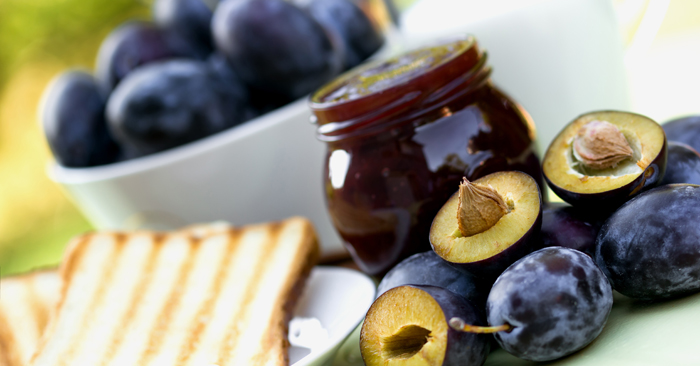
Manage your stress levels
Studies show that stress has an adverse impact on our food preferences: when the going gets tough, we tend to make unhealthy food choices. When we’re stressed, we also sleep less, exercise less and drink more alcohol. All of which are bad news from a weight-management and general health point-of-view.
Researchers at Harvard University offer a trio of common-sense tips for countering stress:
- Meditation: The practice will help you to become more mindful of your moods and better able to make healthy food choices.
- Exercise: Activities like yoga and tai chi combine exercise and meditation – a win-win!
- Social support: A listening ear, when you need to offload, from a supportive member of your network of contacts – choose that ear wisely, it could be a friend, a family member or colleague – can also help to alleviate the symptoms of stress.
Love your prunes!
Prunes are sweet, tasty and versatile – whether eaten straight from the pack or as a flavourful addition to a favourite recipe. But did you know that eating them might help with weight loss, too?
A study at Liverpool University discovered that eating 140-170g prunes daily - as part of a weight control diet - may contribute towards weight loss. That’s because prunes are a fruit and thus lower in energy density than some other snacks making them a convenient and healthy choice.
The study of 100 people tested whether - over a 3-month period - eating the fruit boosted weight loss. The findings were that the prune eaters experienced greater satiety – they felt fuller – and greater weight loss than the control group. Dr Jo Harrold, who led the research, said: "Prunes may be beneficial to dieters by tackling hunger and satisfying appetite; a major challenge when you are trying to maintain weight loss." Yet another reason to fall in love with the humble prune!
Don’t skip meals!
When you’re trying to control your weight, skipping meals – like breakfast - can be all too tempting. Don’t! Skipping meals can lead to reduced energy, making physical activity feel like a challenge too far. And allowing yourself to get too hungry can lead to overeating, at your next meal. Get your day off to a good start and make friends with brekkie.
Please Note: Prunes are good for digestion and help keep you regular, when 100g are eaten as part of a varied and balanced diet and an active lifestyle. Always consult a GP if you have any health concerns.
There's lots to love about yoga!
Posted Fri, Jun 11, 21 by Sunsweet
Whether you're a man or a woman, a child or a pensioner, whether you're looking for a strenuous workout or a more relaxing - even spiritual - practice, there's a style of yoga to suit you. And don't worry, uber-bendiness and hippy-print harem pants are optional. But the health benefits that you'll experience aren't. From boosting digestion to alleviating chronic conditions, there's lots to love about yoga!

International Yoga Day
The first UN International Yoga Day took place in 2015, in recognition of:
- The holistic benefits of the practice and its compatibility with the principles and values of the United Nations
- How crucial it is for us all to make healthy lifestyle choices and to develop habits that support our physical and emotional wellbeing
Will you be inspired by this year's event – on the 21st June – to give yoga a go?
History
The idea of an International Yoga Day was first mooted by the United Nations after a compelling proposal from Indian Prime Minister Narendra Modi. In his proposal, Modi stated that, “Yoga is an invaluable gift from our ancient tradition. Yoga embodies unity of mind and body, thought and action ... a holistic approach [that] is valuable to our health and our well-being. Yoga is not just about exercise; it is a way to discover the sense of oneness with yourself, the world and the nature.”
The Health Benefits of Yoga
The World Health Organization has implored member states to take steps to address the growing inactivity of individual citizens – an unhealthy trend that is a key risk factor in diseases like cancer, diabetes and cardiovascular disease.
According to the Mayo Clinic, a non-profit committed to clinical practice, education and research - the potential health benefits of yoga include:
- Stress reduction, a better night's sleep, improved mood and an enhanced sense of well-being
- Improved fitness, balance, flexibility and strength
- Management of chronic conditions like heart disease and high blood pressure
Something for Everyone
Whatever your age or ability level, there's a yoga style and approach that is just right for you. From active kids who need an opportunity to wind down, after a hectic day juggling school, homework and after-school activities. To elderly people and those who are less mobile and would appreciate the mind, body and spirit benefits of a gentle armchair practice.
Here are a few of the more popular styles:
- Hatha yoga is a foundation of all yoga styles and can be a good choice if you're looking to improve flexibility. It’s controlled breathing can help improve oxygenation of the body and alleviate stress.
- Iyengar yoga: Using Props - belts, blocks and pillow-like bolsters – that assist with correct alignment, it is gentle and can work well for those with an injury or a chronic condition.
- Ashtanga yoga can offer a new challenge for those who already have a decent level of fitness.
- Bikram Toya: Bikram yoga is the favourite of anyone who loves to sweat! The poses are done in a heated room to facilitate the release of toxins and designed to provide a challenging, invigorating, rejuvenating yoga experience.
Whatever style you choose, an initial one-to-one session with an experienced teacher can be really worthwhile, to assess your unique needs and to get you off to the best possible start.
Find yourself a nearby class, get yourself signed up for a course and enjoy the sensations of lightness, ease and relaxation that will surely follow. Bliss!
PS If you're feeling inspired about getting your body moving, why not download our Healthy Living Guide? Good luck!
Please Note: Prunes are good for digestion and help keep you regular, when 100g are eaten as part of a varied and balanced diet and an active lifestyle. Always consult a GP if you have any health concerns.
The Top 6 Questions We’re Asked About Prunes
Posted Thu, Feb 27, 20 by Sunsweet
Everything you ever wanted to know about prunes – and, quite possibly, a little bit more besides - all in one place! Check out our official, super-informative Q&A on all things Sunsweet prune-related. The Top 6 Questions We’re Asked About Prunes.
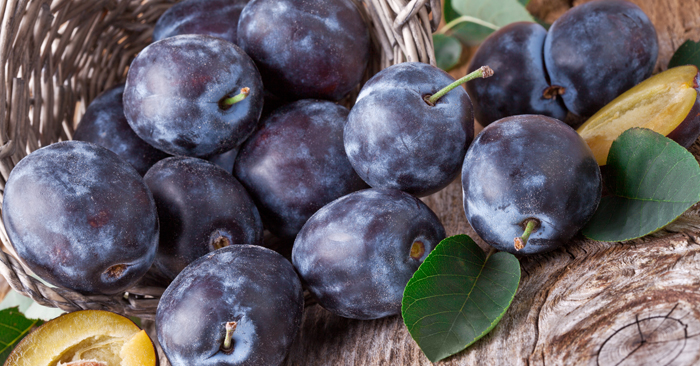
- Are prunes gluten-free?
- Are prunes suitable for people with diabetes?
- Do prunes contain sugar?
- What effect do prunes have on the digestive system?
- What is the connection between prunes and strong bones?
- And, our favourite, just how exactly does a plum become a prune?
Reports suggest that – for a whole host of reasons - as many as one in four of us are now attempting to live gluten free. Gluten is the protein that is found in grains like wheat. And with things like bread, pasta and cereal being such a staple of everyday meal planning, going gluten free isn’t easy. But the good news? All fruit is naturally gluten free and so a serving of prunes or a glass of prune juice can be enjoyed whenever you like. You can even add them to your favourite coeliac-friendly recipes to give them a sweet and fruity twist.
Experts recommend that to keep blood sugar levels steady, we aim for a diet with an overall GI of 50 or less. But, happily, that doesn’t mean that sweet and tasty snacks like Sunsweet prunes are a no-no. Harvard Medical School found that the GI of pitted prunes is around 29 making them a low-GI fruit that doesn't dramatically affect blood sugar and insulin levels.
Prunes contain no added sugar. They are simply dried plums: one plum becomes one prune, just with the water removed. During the plum-prune drying process, sucrose is hydrolysed to glucose and fructose so prunes contain minimal sucrose. And prunes are classed as whole fruit so they can contribute towards achieving your 5-a-day, as well as boosting your daily fibre intake.
For centuries, prunes – and prune juice - have been associated with good digestive health. But now there are scientific findings to support that association, too. Research has shown that - when 100g of prunes are eaten daily, as part of a varied and balanced diet and an active lifestyle – they can assist with normal bowel function just as much as fibre supplements. In fact, prunes should be considered as a first line therapy when it comes to maintaining a healthy bowel.
Research suggests that prunes, due to the nutrients they provide, could be beneficial for bone health. Prunes contain vitamin K and manganese that - among other functions - have direct benefits for bone health. Prunes are also a source of vitamin B6 which helps make healthy blood cells in our bone marrow and maintain normal hormone levels including those involved in bone health.
It’s simple, really. Sunsweet prunes are a special variety of sun-ripened plums that have been dried to remove some of the water. A variety with an exceptionally high sugar content, these "Improved French" variety of plums give Sunsweet prunes their distinctively delicious taste; rich and fruity with notes of creamy vanilla. The dried fruit contains similar levels of nutrients – such as fibre - to fresh plums, while offering the added benefit of year-round availability and a long shelf life.
Please Note: Prunes are good for digestion and help keep you regular, when 100g are eaten as part of a varied and balanced diet and an active lifestyle. Always consult a GP if you have any health concerns.
The top three nutritional reasons to keep loving prunes this season
Posted Fri, Jun 11, 21 by Sunsweet
Did you know that there are lots of compelling reasons why prunes should be top of the class, and not just at back-to-school time? Not convinced? Well, here are our top three seasonal reasons why you – and your family - should be making friends with prunes!

Understandably, you may be reluctant to kiss goodbye to the summer. But, no matter what your life stage, the autumn is an excellent opportunity to embrace that back-to-school feeling, in whatever way you and yours can this year. September is the perfect time of the year to get back to basics, from a health and fitness point-of-view. And, guess what, prunes are a great place to start!
The top three seasonal reasons to love prunes
- You can give your immune system a fighting chance to keep all of those annoying autumnal bugs at bay … with prunes! The dried fruit is a rich source of vitamin B6 and copper, both nutrients are able to help to support a healthy immune system.
- The holiday suitcase is back on top of the wardrobe for another year, the nights are getting longer, darker and colder so it’s not uncommon - or indeed surprising - for your energy and motivation levels to start to take a downward turn. But did you know that prunes can help? Vitamin B6 - which we mentioned above - can help you to feel less tired, it also supports the normal release of energy from foods and the transportation of iron in the body. Copper and manganese – both of which are found in prunes – assist in some of these functions too.
- Prunes have lots of heart health benefits. They’re naturally saturated fat free and reducing the consumption of saturated fat helps to maintain normal blood cholesterol levels. They’re naturally salt-free, too, and reducing the intake of salt helps to maintain normal blood pressure.
There really is a lot to love about prunes!
Want to find out more? Take a look at our online guide to the health-boosting properties of prunes or check out our FAQ
On a more serious note…
Scientific research has been undertaken into the role that prunes can play in potentially helping to prevent serious illness. And a recent study found that eating prunes regularly, may help to reduce the risk of developing bowel cancer.
Professor Dr Nancy Turner Texas A&M University said: “Through our research, we were able to show that dried plums promote retention of beneficial bacteria throughout the colon, and by doing so they may reduce the risk of colon cancer.”
According to the NHS, bowel cancer is one of the most common types of cancer diagnosed in the UK.
That back-to-school feeling
The daily ‘little break’ and ‘big break’ for kids, and adults, are always a challenge but don’t overlook the snacking potential of prunes. With no added sugar, prunes are naturally sweet. And, let’s face it, which child isn’t on the hunt for something sweet the second they walk in the door?! Negotiating playground and office politics is hungry work after all!
Enjoyed straight from the pack, included in the family’s favourite bakes or whizzed into a smoothie, prunes make the perfect lunchbox filler or healthy after-school treat.
You can check out our delicious smoothie recipe suggestions, here:
Please Note: Prunes are good for digestion and help keep you regular, when 100g are eaten as part of a varied and balanced diet and an active lifestyle. Always consult a GP if you have any health concerns.
Tip-top digestion: it’s what everybody wants for Christmas!
Posted Tue, Dec 24, 19 by Sunsweet
Most of us don’t give a second thought to our digestive systems, until they start to get out of sync. And then it’s hard to think about anything else… Be kind to your tum, this Christmas. Tucking into Sunsweet prunes and prune juice is a simple way to start!
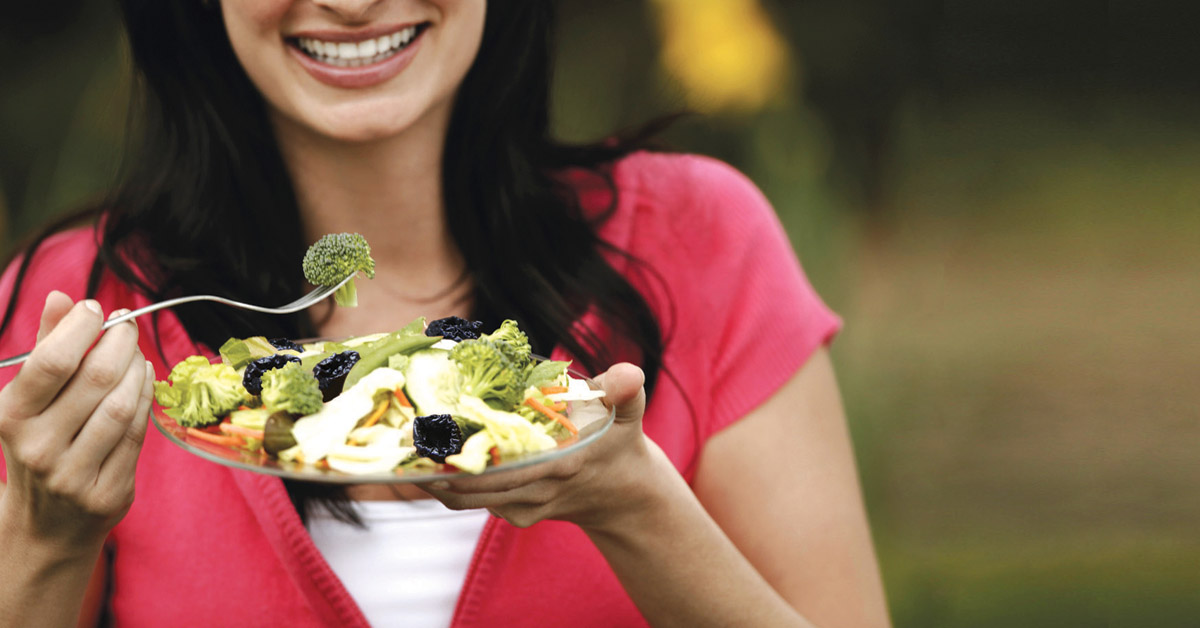
OK, we understand that digestion isn’t the most festive of topics. But it’s at this time of year, when the food that we eat gets richer and more plentiful and – apart from dashing frenetically from shop-to-shop - our lifestyles become more sedentary, that we really need to keep on top of things, digestion-wise. Digestion is a complex chemical and physical process and a healthy digestive system can play an important role in our overall sense of well-being. If our digestion gets out of synch, the entire body can feel its effects with symptoms like bloating, reflux, constipation and diarrhoea.
It’s hard not to overindulge at Christmas. Most of us are guilty of stocking up our homes with deliciously tempting – but not always healthy! – food and drink. Traditional yuletide treats are typically low in fibre and they can be richer and more protein-packed than we’re used to, too. This - in combination with a higher intake of alcohol, a lower rate of physical activity and sky-high stress levels - can place extra demands on the digestive system.
Top Tips for Improving digestion
There is good news, though! Read on for some quick tips on improving digestion:
- We know it’s hard but try to take some regular time out of the ‘busy-ness’ to simply relax. Walking with a friend, some gentle yoga stretches, listening to music, whatever helps you to unwind.
- Be mindful of what you’re eating, especially when you’re busy and distracted. Chew well and eat slowly so that you’re more likely to stop eating before you get too full.
- It makes sense to avoid ice-cold drinks while eating, because they can contribute to a sluggish digestion.
- And try eating prunes and drinking prune juice daily!
Why prunes?
For years, prunes and prune juice have been associated, anecdotally, with digestive health. But now there are scientific findings to extoll the benefits of prunes. Prunes help to promote normal bowel function just as well as fibre supplements and they should be considered as a first line therapy when it comes to maintaining a healthy bowel.
So, the inclusion of Sunsweet prunes and prune juice in your everyday diet certainly makes a lot of sense! 100% natural, our products can be enjoyed by the whole family including children, pregnant women and the elderly. Prunes are surprisingly versatile and can add a nutritious boost to family meals at any time of the year. Their flavour can add depth and richness to comfort foods, like tempting mousses and slow-cooked stews. They can even add a fresh and fruity note to salads and smoothies, too.
Please Note: Prunes are good for digestion and help keep you regular, when 100g are eaten as part of a varied and balanced diet and an active lifestyle. Always consult a GP if you have any health concerns.
To Snack is Human- To Enjoy Healthy Snacks is Divine
Posted Fri, Jun 11, 21 by Sunsweet
Snacking is here to stay and has become a fact of modern life. If snacking in between meals is part of your busy lifestyle, it’s good to know that dietitians today will give you their good nutrition stamp of approval. That is, of course, if the foods and beverages you pick are healthful choices! To find out what those healthy choices might be we enlisted the help of nutritionist Carolyn O'Neil, MS, RD.
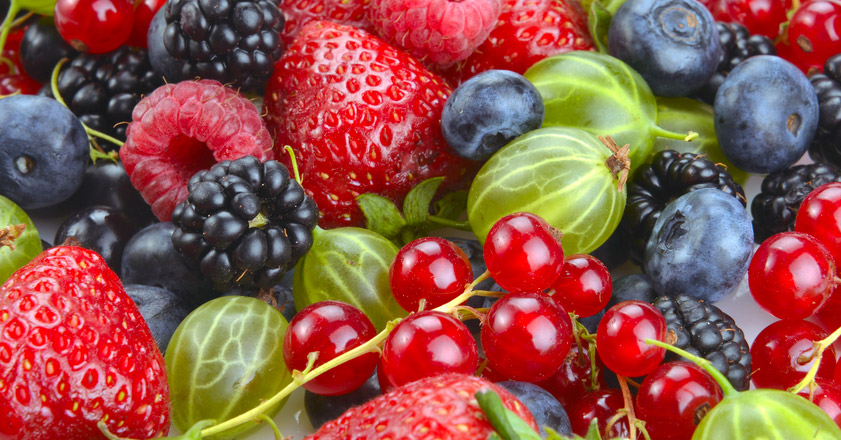
Healthy snacking on a budget
The following tips should help us select guilt free snacks while keeping more of our hard earned cash in our pockets:
Reach for Shelf-Stable Snacks
Fresh fruits and vegetables play an important part in healthy snacking. It's best to plan around what's currently in season because out-of-season fruits and vegetables are sometimes imported, expensive and often tasteless. Dried fruit provides a nutritious and more shelf-stable option year round, which could save money on spoiled food.
Energy
It's easy to grab a biscuit or a muffin when our energy wanes at the office. They may deliver a scrumptious quick fix, but as a habit, they take a big bite out of our budget and our energy reserves. Choosing complex carbohydrates containing fiber helps to keep our energy revved up so we can make it to the gym, the Boardroom, or wherever our energy needs us to go.
Antioxidants
Antioxidants are important vitamin-like compounds that help support our immune system, promote a healthy heart and slow the aging process. Some antioxidants (water –soluble antioxidants) are not stored by the body and remain in our system for only 4 to 6 hours. It's important to replenish our body with these nutrients throughout the day - including snack time.
Curb Your Appetite
Skipping meals causes us to lose touch with our body’s natural hunger cues. When meal time finally arrives we tend to eat too much and choose the wrong things (because we are so hungry). Factoring in small snacks between meals helps keep our appetite in check, our hunger satisfied, and helps us to make healthier choices at all of our meals.
Stabilise and Energise
Fueling our body with meals and snacks at regular intervals is necessary to maintain healthy blood sugar levels. Stable blood sugar not only helps us control hunger cravings, it reduces our risk for diabetes and even helps promote fat loss. The ultimate even blood sugar snack should include complex carbohydrates, along with a little protein and fat.
Calcium
Most people simply aren't getting enough of this bone-building nutrient. Drinking milk with our meals is one option. Calcium-rich snacks are a valuable back-up plan.
You can learn more about healthy eating by visiting the nutrition section of our website.
5 ways to master the art of healthy snacking
Over the years we have looked at lots of research on snacking behaviours. We have come to the conclusion that rather than trying to avoid snacks we should just try and pick healthy choices when we feel the urge. The following tips should help:
Plan Mini-Meals
Think of a snack as a mini-meal and an opportunity to add servings of healthy foods to your day. For instance, three or four whole wheat crackers topped with low fat cheddar cheese and sliced apple provides needed nutrients from the grain, dairy and fruit groups. Adding a protein source (such as cheese, yogurt, or nuts) will help tame hunger longer.
Make it Convenient
Since you are often grabbing a snack because you’re hungry and in a hurry, plan to have healthy grab and go options close at hand. Dried fruit such as Sunsweet prunes can be stashed in your desk drawer, your purse or your car so that you easily enjoy something sweet on the go. Or how about an individually wrapped humzinger – Who says they are just for kids!
Enjoy What You Crave
But do it the smart way. If you’ve got to have something savoury and crunchy, choose options that meet that need without a lot of fat and calories. If your snack-tooth craves something sweet, reach for fruit instead of sweets or chocolate. Want something smooth and creamy? Choose lowfat or nonfat yogurts instead of ice cream. You’ll get more calcium per serving and save big time on fat and calories.
Keep Size in Mind
Portion control is just as important when planning snacks. So, remember this is just a few bites to tide you over until mealtime. Try to limit snacks to about 100 calories. That could be 1 cup of celery sticks with 2 tablespoons of hummus dip or the sweet indulgence of savouring 4 Sunsweet prunes.
Think About Drinks
Drinks (non alcoholic of course!) can contribute to good nutrition, too. Nonfat milk and vegetable juices are a liquid source of vitamins, minerals and in the case of fruit juices, they can be a source of dietary fiber. So, when choosing a drink for a snack, think about its health benefits, too.
Try Something New This Christmas!
Posted Fri, Jun 11, 21 by Sunsweet
This year, at Christmas time, why not try something new? Like putting yourself first. After all, you can’t pour from an empty cup! It may be a cliché but it’s no less true because of that. And who knows? If you take a little time out to reflect on what really matters to you - and your family – at Christmastime, you might just make this Christmas your best ever!

Everybody’s priorities are different. A formal feast with fabulous friends is festive heaven for some people. While others prefer a quieter more intimate affair. And, for some, children about the place makes anything elaborate or overly structured just one stress too far.
Decide what’s important to you: is it having a houseful of friends, relaxing with close family or something in between? If you’re honest about what constitutes your perfect Christmas, you’ll give yourself the best chance of getting it!
Letting off steam, on the big day
Don’t overlook the restorative properties of physical activity, even in the midst of all the festivities. With a bit of strategic delegation, you’ll be able to keep even the youngest members of the household occupied while ticking an item or two off your task list. Draw up a list of what needs to be done - from peeling the sprouts to bagging up the wrapping-paper for recycling – and make sure that everyone gets stuck in. There could even be a fun league table with prizes to be won, for “The Most Cheerful Helper” perhaps or “The Speediest Table Clearer”. Have fun together and make sure you’re not shouldering the Christmas workload alone.
Stress and tummy trouble
Digestion is a sensitive process that can be compromised by stress. And – with the best will in the world – Christmas can be stressful! When the digestive system gets out of synch, the whole body can feel its unwelcome effects with symptoms like bloating, constipation and indigestion. But the great news is that prunes can help. They’ve long been associated, anecdotally, with digestive health. But new research suggests that prunes should be considered “a first line therapy” because - when 100g of prunes are eaten on a daily basis - they can help to support normal bowel function. Our Digestion 101 is packed with hints and tips for maintaining a healthy digestive system.
Cultivating an attitude of gratitude
Christmas is a great opportunity for counting your blessings. We know, it can be hard! But research by the University of Berkeley found that being grateful has lots of potential health benefits. It can:
- have a positive impact on our emotional wellbeing and on our relationships
- reduce our likelihood of becoming depressed
- increase our resilience when faced with life's many and inevitable challenges
So take a look at your home and your loved ones, in all their messy, imperfect and beautiful glory, raise a glass and give thanks. Happy Christmas!
Please Note: Prunes are good for digestion and help keep you regular, when 100g are eaten as part of a varied and balanced diet and an active lifestyle. Always consult a GP if you have any health concerns.
Vegetarian Tortillas
Posted Tue, Aug 18, 20 by Sunsweet
Had your fill of soggy sandwiches and paltry pastries? In the market for something fresh and flavoursome and perfectly portable? Bid farewell to boring lunch-time fayre and give our yummy Vegetarian Tortillas a go. At your desk. As part of a springtime picnic. They'll liven up your lunch-time, wherever you choose to eat them!
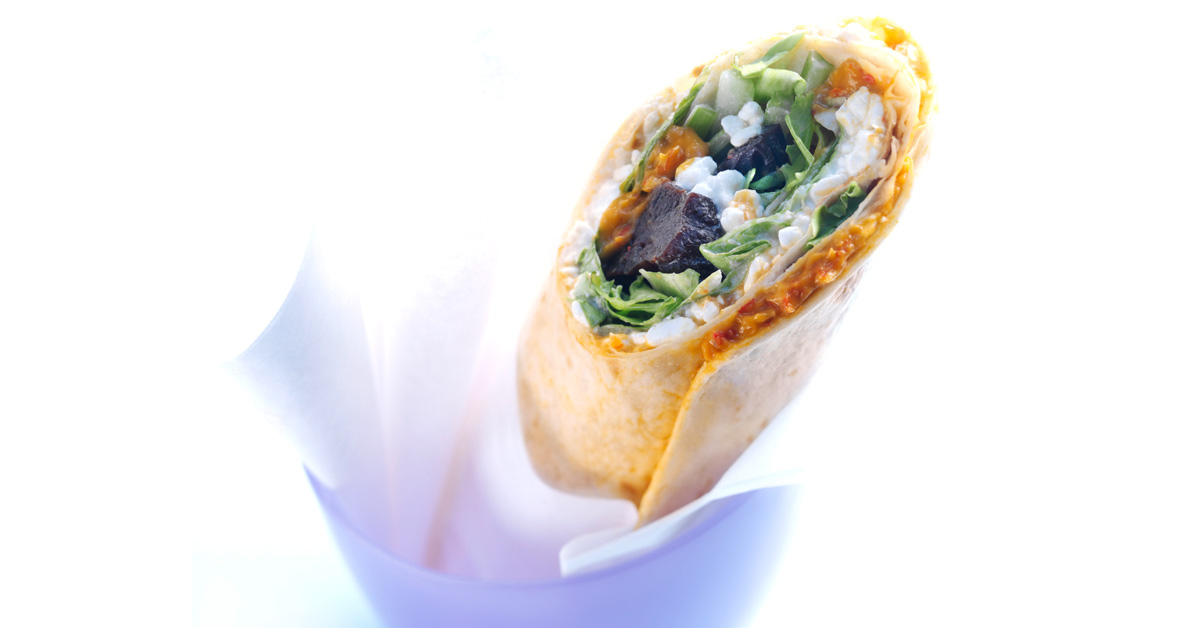
Ingredients
1 ripe avocado
3-4 tablespoons of hot chilli sauce
Zest of ½ organic lemon
Salt
¼ head iceberg lettuce (approx. 150 g green leaves)
1 celery stick
4 soft tortilla wraps (58 g each)
200 g low fat cottage cheese
200 g Sunsweet prunes
Instructions
- Chop iceberg lettuce into thin slices, wash and shake dry. Cut avocado in half, remove pit and spoon out the avocado meat. Mash avocado with a fork. Add hot chilli sauce and lemon zest and mix well. Season with salt. Clean and wash celery and cut lengthwise into very thin slices.
- Spread first the avocado mixture, then the cottage cheese on the tortilla wraps. Coat half of the wrap with iceberg lettuce. Place the prunes and celery lengthwise on the wrap. Roll up the wrap very tightly and cut diagonally in half.
Other recipes you might be interested in...
Vernal Pea Soup with Cream Cheese Dumplings
Posted Fri, Jun 11, 21 by Sunsweet
An elegant starter. A light and tasty lunch. A bowlful of springtime beauty. Our delicious Vernal Pea Soup with Cream Cheese Dumplings is actually surprisingly simple to make. And with less than 300 calories in each bowl, we are certain that it'll become a firm favourite in your family's recipe repertoire, too. Enjoy!
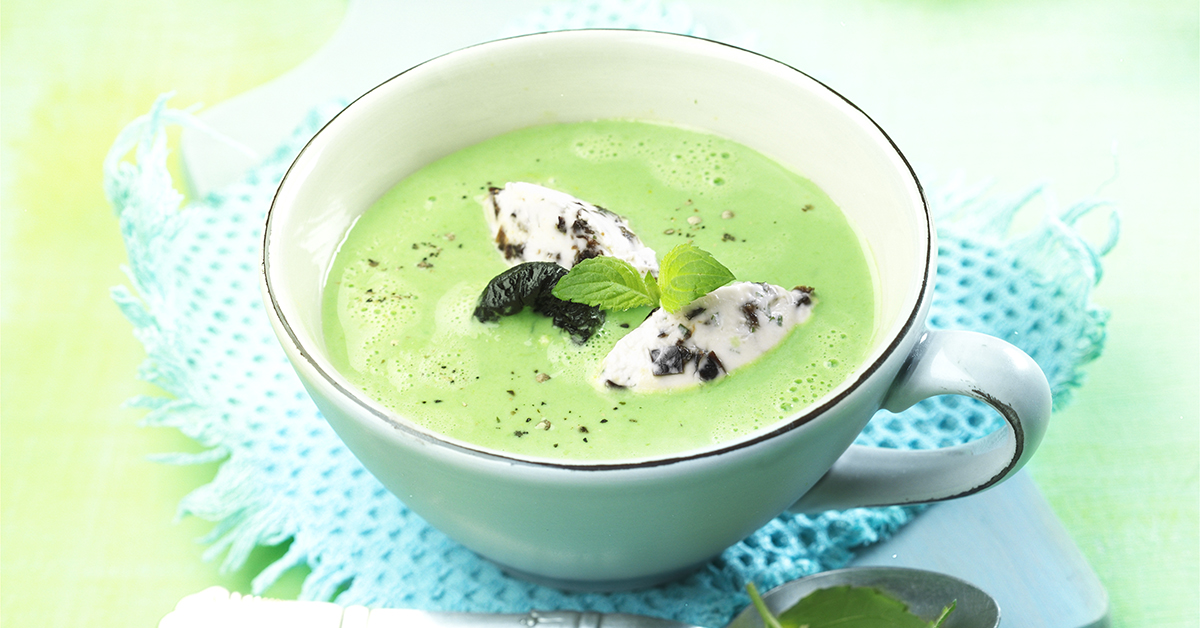
Ingredients
1 onion
1 tsp. olive oil
400 g frozen peas
300 g vegetable stock
200 ml kefir
80 g California prunes
100 g cream cheese
4 sprigs of mint
Salt & pepper (coarse)
Instructions
- Finely dice onion. Heat oil in a pan and sauté onions until translucent. Add peas and sauté for 1 minute. Deglaze with vegetable stock, bring to a boil and simmer for about 10 minutes over medium heat.
- Remove pan from heat and finely blend with a hand blender. Pour the soup into a metal bowl, place it in cold water and allow soup to cool.
- Stir kefir into the cold soup. Season with salt and pepper. Finely chop prunes and mint and mix with cream cheese. Form small dumplings using 2 wet teaspoons and serve with the soup. Garnish with mint and pepper.
Tip: serve with toasted baguette.
Other recipes you might be interested in...
We Are What (And How) We Eat
Posted Fri, Jun 11, 21 by Sunsweet
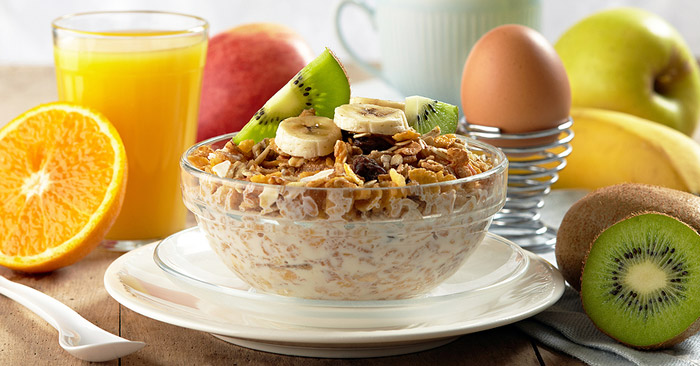
Most of us have heard the phrase “you are what you eat”. However Dr. Nick Read, gives us a fresh perspective on this old saying including - “you are how you eat”.
Professor Nick Read is a consultant gastroenterologist and analytical psychotherapist. He uses both of these disciplines in combination to investigate and treat patients with mind-body diseases, particularly those with functional gastrointestinal disorders.
Dr. Read is currently the Chair of the IBS Network in the UK, an independent charity dedicated to support, inform and advise people with Irritable Bowel Syndrome (IBS).
While encouraging us to make the 5-a-day an integral part of our daily nutrition plans, he also draws our attention to the environment and manner in which we consume food. Relaxation, company and liking what you eat, for instance, all contribute to digestive health and overall well-being.
Maintaining the right fibre intake can also help many of our digestion and bowel problems. Dr. Read recommends natural prune juice (like Sunsweet®) as a nutritious and stimulating addition to the daily diet. It contributes to the veggie and fruit intake and also helps the digestive system.
Watch our Eating and Drinking Well video and hear what Dr. Read has to say about the positive impact of a healthy diet on constipation and his recommendations on natural treatments and preventative measures.
We very much fancy a slice of this Dense Chocolate Cake
Posted Fri, Nov 20, 20 by Sunsweet
Our Dense Chocolate Cake is wonderfully moist, super chocolatey and surprisingly simple to make. But there’s something that’s even more surprising. Our cake is a gluten-free bake and each delicious slice contains fewer than 400 calories. And it smells amazing while baking!
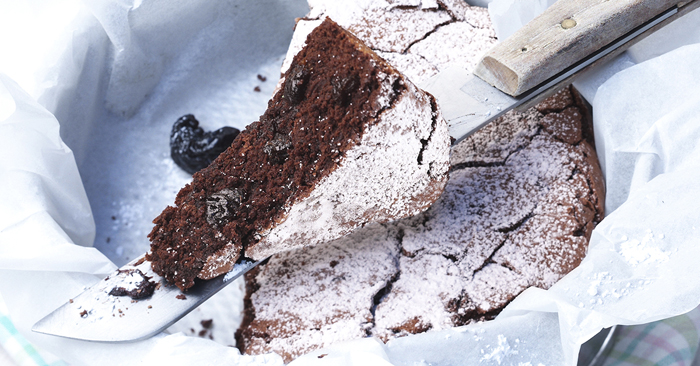
Ingredients
200 g dark chocolate
100 g butter, cubed
1 vanilla pod
5 eggs
1 pinch of salt
100 g sugar
150 g California prunes
3 tbsp. cocoa powder
Confectioner's sugar for dusting
Other:
Cake springform baking tin24 cm
Instructions
- Preheat the oven to 160° C (convection oven 140° C). Line spring form with baking paper. Chop chocolate. Cut butter into cubes. Place both into a bowl and melt over hot water. Cut vanilla pod in half and scrape out the seeds.
- Separate eggs and beat the egg whites, salt and sugar until stiff. Remove chocolate from water, allow to slightly cool, and then stir in the egg yolks. Stir in prunes, vanilla seeds, and cocoa powder, carefully fold in egg white.
- Pour the cake mixture into the springform baking tin and bake for 40 minutes. Allow the cake to cool and serve dusted with confectioner's sugar.
Other recipes you might be interested in...
What is the California Prune Board
Posted Tue, Apr 27, 21 by Sunsweet





